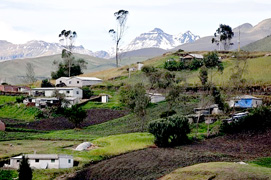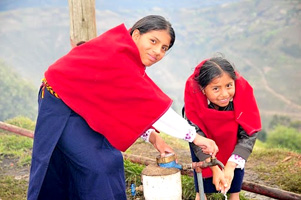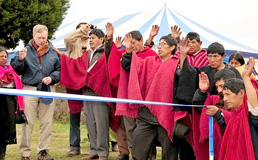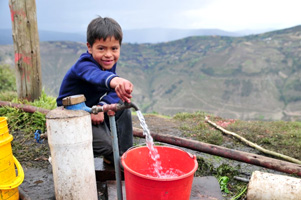(Oct. 14, 2011 - by Cristian Zurita; translated by Ralph Kurtenbach) Living and practicing community, the people of Ecuador's Andean region often combine their efforts, tackling tasks too big for individual efforts. In highland communities commonly inhabited by the Quichua-speaking people, such a collective effort is known as a minga.
 Through mingas, rural dwellers complete everything from planting and harvesting crops to digging irrigation canals.
Through mingas, rural dwellers complete everything from planting and harvesting crops to digging irrigation canals.
Some communities take on other work projects as well. For residents of Santa Rosa de Gaunán, the efforts culminated on Sept. 23-24 with the dedication of a clean water system. Just an hour south of Riobamba in Chimborazo province, community members worked together with consultation from HCJB Global Hands' Clean Water Projects team.
After a year of hard work, laboring at altitudes of up to 10,500 feet in this community and eight surrounding villages of the Moste Chico sector, the joy of the children, young adults and older adults was characterized as "indescribable."
 "We've not only received this water, but also the water of life; we have received the gospel," said Carlos, a pastor from Santa Rosa. "Indeed, some are now preaching the gospel. For us, for me personally, I say thank you. We've worked hard to construct this Moste Chico piped water system."
"We've not only received this water, but also the water of life; we have received the gospel," said Carlos, a pastor from Santa Rosa. "Indeed, some are now preaching the gospel. For us, for me personally, I say thank you. We've worked hard to construct this Moste Chico piped water system."
By digging miles of four-foot deep trenches for PVC distribution pipe, constructing spring protection structures and building reservoirs for storage, the community built a system that serves some 40 families.
 |
|
Bruce Rydbeck officiates at the |
Expressing his delight at the ribbon-cutting ceremony, HCJB Global Hands missionary Bruce Rydbeck called it "a pleasure to be present and dedicate the water system to serve all and this community, and to the glory of God."
Throughout the year, Rydbeck's team also encouraged good hygiene and nutrition to improve health. With help from visiting team members of the First Presbyterian Church of Schenectady, N.Y., HCJB Global's team held a vacation Bible school event for the children in July.
The change in the community will be pronounced. Beforehand, people had spent four hours daily carrying water to their homes and for their livestock. The system will free up children's time now that they won't need to carry water to their homes.
 One example is Diego, a sixth-grader. He described a typical day, rising at 5 a.m. to leave for school at 6 a.m. Around 1 p.m. his classes let out, and he runs home to have lunch with his family, no longer needing to spend his afternoons hauling water.
One example is Diego, a sixth-grader. He described a typical day, rising at 5 a.m. to leave for school at 6 a.m. Around 1 p.m. his classes let out, and he runs home to have lunch with his family, no longer needing to spend his afternoons hauling water.
Adults in the community recalled that in the last several decades, they've only received empty offers to answer their needs for a reliable source of potable water. That changed with completion of this clean water system, but not before many young people had left in search of a better way of life in the cities.
The most important lesson of all throughout this experience was this-local residents worked hard together to build this system. Now they need to work together to maintain it so that they can remain healthy. After all, a healthy body is pleasing to God.
"As president of the Junta Administradora de Agua Potable of the nine communities of Moste Chico sector, I'm happy we have a water system," said Ricardo Huashpa who leads the area's water board. Adding that it serves to illustrate Jesus, the Living Word, Huashpa said the project "has brought the gospel to us and many have become believers. They are in the Lord's work now."
Source: HCJB Global
Photo credit: Martin Harrison
